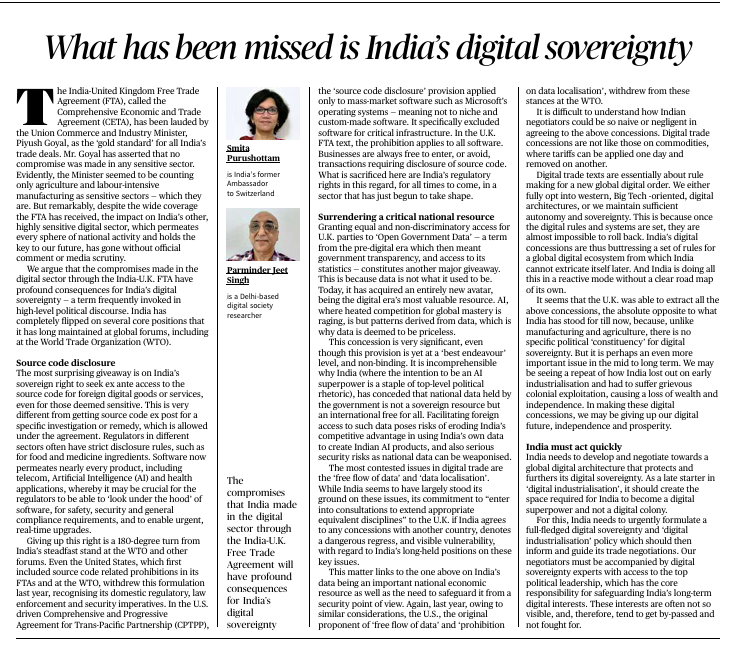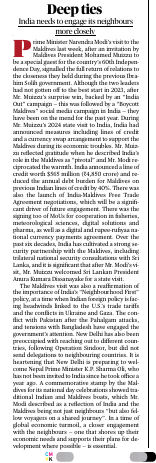Summary – What has been missed is India’s digital sovereignty
1. Context
- The India–UK Comprehensive Economic and Trade Agreement (CETA) has been praised as a ‘gold standard’ by the Commerce Minister.
- While attention focused on agriculture, labour, and manufacturing, the digital sector — critical to India’s national security — has been overlooked in public discussion.
2. Key Concerns
a) Source Code Disclosure
- India has allowed foreign entities access to source code for goods/services — even in sensitive sectors.
- Different regulators can now demand source code for inspections and approvals, covering telecom, medical devices, financial services, and safety-related sectors.
- Under the UK FTA, this applies to all software, including critical infrastructure.
- This sacrifices India’s right to regulate and secure its digital ecosystem.
b) Surrender of Critical National Resource
- Agreement grants UK equal, non-discriminatory access to government data (‘Open Government Data’ principle).
- Data is termed the “new oil” — its free access compromises India’s control over valuable datasets.
- Such provisions erode strategic leverage and security.
c) Data Localisation and Cross-Border Data Flows
- UK has long opposed strict data localisation laws; CETA reflects this stance.
- Could undermine India’s efforts to retain data within national borders for privacy, security, and economic advantage.
3. Implications
- Weakens India’s digital sovereignty — the ability to control its digital infrastructure, systems, and data.
- May restrict India’s future ability to regulate Big Tech and secure critical sectors.
- Risks turning India into a passive participant in the global digital order rather than a rule-maker.
4. Way Forward
- Negotiate data and digital trade provisions with as much seriousness as agriculture or manufacturing.
- Maintain regulatory autonomy to ensure security and public interest.
- Build domestic capability in digital technologies to reduce dependency.
UPSC Mains Practice Question
GS Paper 2 – International Relations & GS Paper 3 – Internal Security
“Discuss the challenges posed by international trade agreements to India’s digital sovereignty. Suggest measures to protect national interest while engaging in global digital trade.”
Summary – Deep ties: India needs to engage its neighbours more closely
1. Context
- PM Narendra Modi’s visit to the Maldives was his first foreign trip in his third term.
- The visit aimed to repair bilateral ties, strained during the Maldives’ previous government, and reaffirm India’s role as a key regional partner
2. Key Highlights of the Visit
- Economic Assistance: India extended $50 million in budgetary support to the Maldives.
- Infrastructure Projects: Renewed commitment to ongoing and new projects, especially in housing, roads, and energy.
- Trade & Investment: Discussion on improving bilateral trade under the India–Maldives Trade Agreement.
- Security Cooperation: Reaffirmed defence and maritime collaboration, crucial given the Maldives’ strategic location in the Indian Ocean.
3. Strategic Importance
- The Maldives is central to India’s Neighbourhood First policy and Security and Growth for All in the Region (SAGAR)
- Strategic location along critical Indian Ocean sea lanes makes it a valuable partner in maritime security.
- Preventing Chinese strategic inroads remains a priority.
4. Challenges
- Past tensions over India’s military presence and perceptions of interference.
- Competition from China’s Belt and Road Initiative (BRI) investments.
- Need to maintain goodwill while avoiding over-dependence concerns.
5. Way Forward
- Deepen Economic Linkages: Enhance bilateral trade, tourism, and investment.
- Sustain People-to-People Ties: Scholarships, healthcare, and cultural exchange.
- Maritime Security: Strengthen joint patrolling, capacity building, and anti-piracy measures.
- Balanced Diplomacy: Engage without triggering sovereignty concerns.
UPSC Mains Practice Question
GS Paper 2 – International Relations
“Discuss the strategic significance of the Maldives for India’s maritime security and regional diplomacy. How can India strengthen ties while countering external influence in the region?



